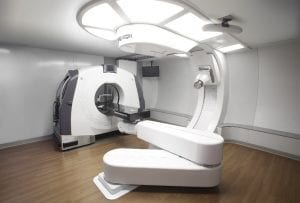Proton Therapy for Mesothelioma: A Safer Radiation Treatment?
 The idea that proton therapy may be a safer alternative to radiotherapy for the asbestos-linked cancer malignant pleural mesothelioma is coming into question in light of recent research.
The idea that proton therapy may be a safer alternative to radiotherapy for the asbestos-linked cancer malignant pleural mesothelioma is coming into question in light of recent research.
A newly published study of proton therapy in patients with inoperable non-small cell lung cancer, a cancer with many similarities to mesothelioma, showed no difference between proton-based and standard photon-based radiotherapy in terms of lung toxicity or outcomes.
The randomized trial was conducted at MD Anderson Cancer Center in Texas and involved 149 non-small cell lung cancer patients who received comparable doses of either proton therapy or intensity-modulated radiation therapy (IMRT).
Proton Therapy and Pleural Mesothelioma
Although the standard of care for pleural mesothelioma is chemotherapy, many mesothelioma patients also undergo radiotherapy, either as a way to reduce the size of a mesothelioma tumor prior to surgery or to reduce mesothelioma symptoms.
Radiotherapy for both pleural mesothelioma and lung cancer is especially challenging because the tumors occur in close proximity to critical organs like the healthy lung and the heart.
Like photon-based radiotherapy, proton-based radiotherapy uses ionizing radiation to kill cancer cells and shrink tumors. But in recent years, some studies have suggested that protons may be safer than photons.
Because they tend to lose energy more quickly as they slow down on their way through tissue, the theory is that protons make it possible to deposit a higher dose of radiation into a mesothelioma tumor without damaging healthy tissue around it.
Are Protons Really Safer?
The goal of the new lung cancer trial was to determine whether proton therapy was less toxic to the lungs than IMRT.
Researchers found that, overall, lung cancer patients in the proton therapy group had 4% more serious complications than those who had IMRT (10.5% vs 6.5%). At the same time, two of the most serious complications to occur during the study, happened in the IMRT group.
Most importantly, although both groups of cancer patients benefited from their radiation therapy, the authors concluded that greatest improvements were seen among those who had standard photon-based IMRT rather than proton therapy.
Unfortunately, a year later, lung cancer had returned at the same spot in about 10% of patients, regardless of what type of radiotherapy they had, and survival was similar between the two groups.
“No benefit was noted in radiation pneumonitis [a potentially fatal complication of radiotherapy] or local failure after passive scattering proton therapy (PSPT),” concludes lead researcher Zhongxing Liao.
Contradictory Evidence for Proton Therapy in Mesothelioma
The new research appears to contradict the conclusion of a smaller study of proton therapy for pleural mesothelioma, published last September.
That study followed the outcomes of three mesothelioma patients who underwent proton therapy following radical mesothelioma surgery.
In all three cases, the patients tolerated the treatment well and received lower doses of radiation into their surrounding at-risk organs than is normally seen with IMRT. The findings prompted Duke University researchers to conclude that proton therapy for mesothelioma was “a feasible and safer alternative to photon IMRT-based radiotherapy.”
Sources:
Liao, et al, “Bayesian Adaptive Randomization Trial of Passive Scattering Proton Therapy and Intensity-Modulated Photon Radiotherapy for Locally Advanced Non–Small-Cell Lung Cancer”, January 2, 2018, Journal of Clinical Oncology, Epub ahead of print
Lee, H, “Proton Therapy for Malignant Pleural Mesothelioma: A Three Case Series Describing the Clinical and Dosimetric Advantages of Proton-Based Therapy”, September 2017, Cureus





